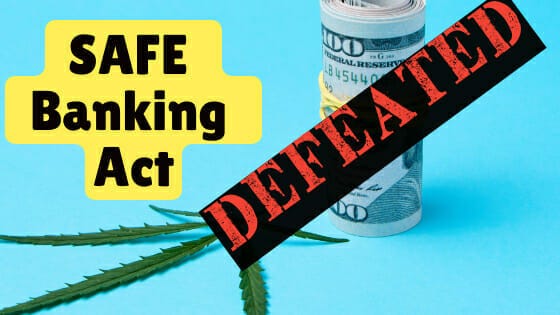SAFE Banking Act Defeated in Congress: Why the Cannabis Industry Still Struggles with Financial Services
The SAFE Banking Act, also known as the Secure and Fair Enforcement Banking Act, is a bill that has been widely supported by the cannabis industry and various advocacy groups. It was introduced in Congress in 2019 with the aim of protecting banks and financial institutions that provide financial services to the cannabis industry. The Act would provide a safe harbor for these institutions by prohibiting federal banking regulators from penalizing them for providing financial services to cannabis-related businesses that are operating legally under state laws. Despite this widespread support, the SAFE Banking Act has faced significant opposition and has yet to become law. This week, the Act was defeated in Congress for the third time, causing concern and frustration among those who had hoped to see it finally pass.

There are several potential pros and cons to the SAFE Banking Act. Some of the pros include:
Pros of the SAFE Banking Act
Providing access to banking services: The lack of access to traditional banking services is a major challenge for the cannabis industry, as it makes it difficult for these businesses to access basic financial services such as bank accounts, credit, and loans. The SAFE Banking Act would help to address this issue by protecting banks and financial institutions that choose to provide services to the cannabis industry.
Reducing public safety risks: The current system, which forces cannabis businesses to operate on a largely cash-only basis, creates additional risks and complications for the businesses themselves, as they are vulnerable to theft and other crimes. The SAFE Banking Act would help to address these public safety risks by allowing cannabis businesses to access banking services and reduce their reliance on cash.
Promoting compliance: The Act would require federal banking regulators to issue guidance to financial institutions on how to provide services to the cannabis industry in a safe and compliant way. This could help to promote compliance with state and federal laws and regulations, which would be beneficial for both the cannabis industry and financial institutions.
However, there are also several potential cons to the SAFE Banking Act:
Cons of the SAFE Banking Act
Undermining federal law: Opponents of the Act argue that it would effectively legitimize the cannabis industry and undermine federal efforts to enforce laws against the drug. This is because cannabis is not legal at the federal level, despite being legal in some form in 37 states.
Impact on public safety: Some people are concerned that the Act could lead to an increase in drug use and abuse, as well as related crimes such as trafficking and distribution. They argue that the Act would create an environment in which the cannabis industry could thrive, potentially leading to more people using the drug and an increase in the number of cannabis-related businesses operating in the country.
Legal and financial risks for financial institutions: Despite the protections provided by the SAFE Banking Act, banks and credit unions may still be hesitant to provide financial services to cannabis businesses given the potential legal and financial risks. They may be reluctant to risk facing charges of money laundering or other penalties from federal regulatory agencies for violating federal laws.
The ongoing legal uncertainty surrounding the cannabis industry, as well as the potential legal and financial risks for financial institutions, may continue to be a barrier to the widespread adoption of the SAFE Banking Act.



